Serving 936 students in grades Prekindergarten-5, Tonganoxie Elementary School ranks in the top 50% of all schools in Kansas for overall test scores (math proficiency is top 50%, and reading proficiency is top 50%).
The percentage of students achieving proficiency in math is 37% (which is higher than the Kansas state average of 29%). The percentage of students achieving proficiency in reading/language arts is 39% (which is higher than the Kansas state average of 32%).
The student:teacher ratio of 15:1 is higher than the Kansas state level of 13:1.
Minority enrollment is 16% of the student body (majority Hispanic), which is lower than the Kansas state average of 39% (majority Hispanic).
Quick Stats (2025)
- Grades: Prekindergarten-5
- Enrollment: 936 students
- Student:Teacher Ratio: 15:1
- Minority Enrollment: 16%
- Overall Testing Rank: Top 50% in KS
- Math Proficiency: 37% (Top 50%)
- Reading Proficiency: 39% (Top 50%)
- Science Proficiency: 45-49% (Top 30%)
- Source: National Center for Education Statistics (NCES), KS Dept. of Education
School Overview
Tonganoxie Elementary School's student population of 936 students has grown by 9% over five school years.
The teacher population of 61 teachers has stayed relatively flat over five school years.
Grades Offered
Grades Prekindergarten-5
Total Students
936 students
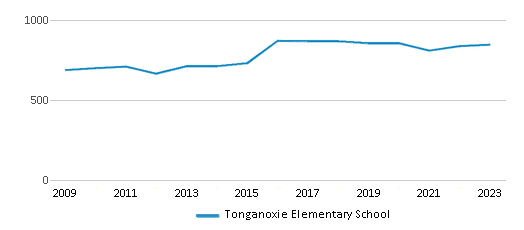
Gender %
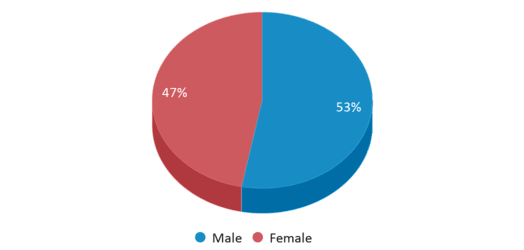
Total Classroom Teachers
61 teachers
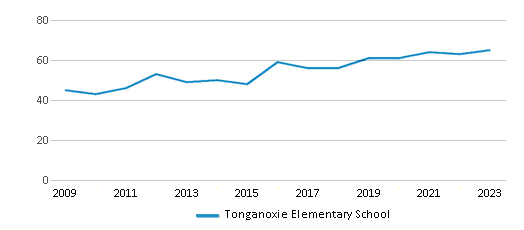
Students by Grade
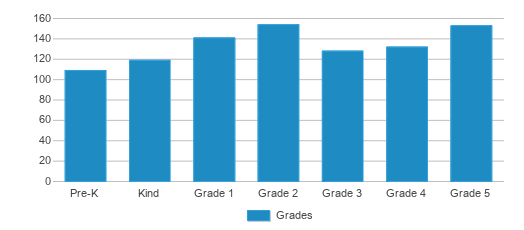
School Rankings
Tonganoxie Elementary School ranks within the top 50% of all 1,280 schools in Kansas (based off of combined math and reading proficiency testing data).
The diversity score of Tonganoxie Elementary School is 0.28, which is less than the diversity score at state average of 0.57. The school's diversity has stayed relatively flat over five school years.
Overall Testing Rank
#421 out of 1280 schools
(Top 50%)
(Top 50%)
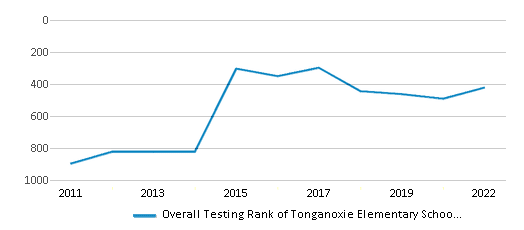
Math Test Scores (% Proficient)
37%
29%
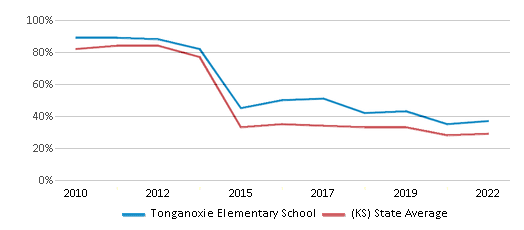
Reading/Language Arts Test Scores (% Proficient)
39%
32%
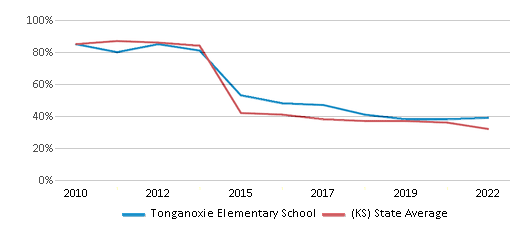
Science Test Scores (% Proficient)
45-49%
31%
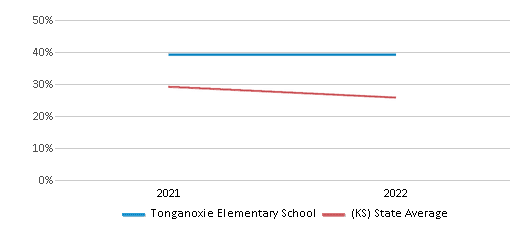
Student : Teacher Ratio
15:1
13:1
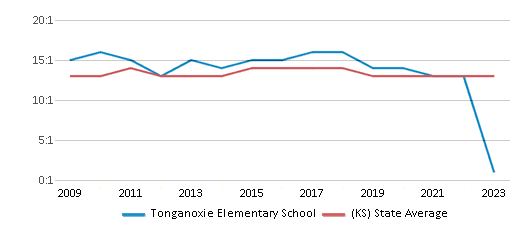
American Indian
n/a
1%
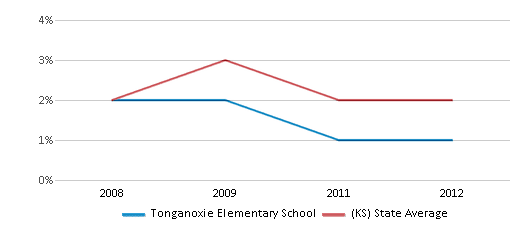
Asian
n/a
3%
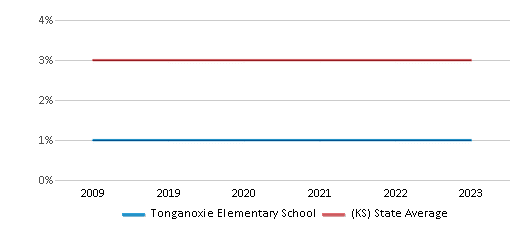
Hispanic
10%
22%
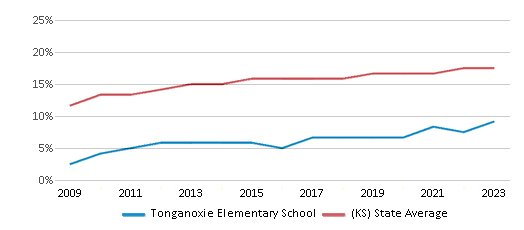
Black
1%
7%
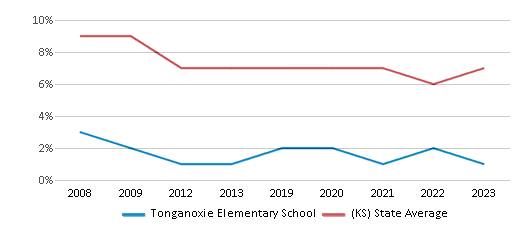
White
84%
61%
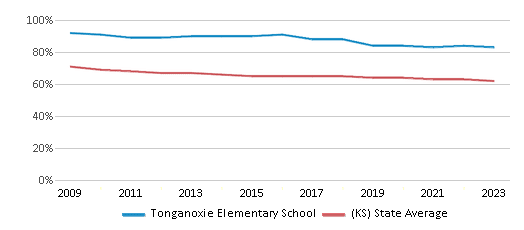
Hawaiian
n/a
n/a
Two or more races
5%
6%
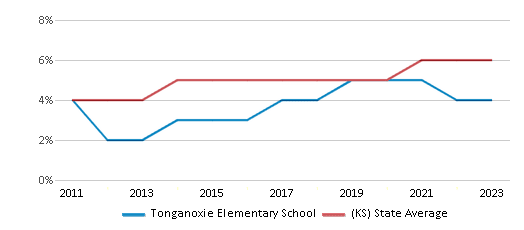
All Ethnic Groups
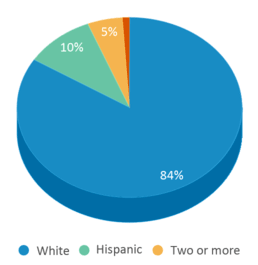
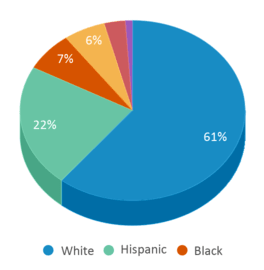
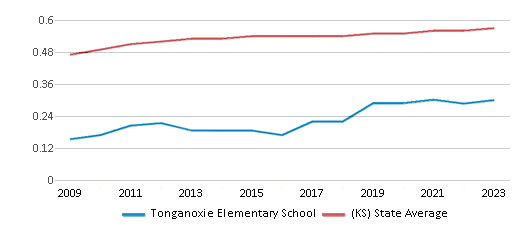
Participates in the National School Lunch Program (NSLP)
Yes
Eligible for Free Lunch
24%
42%
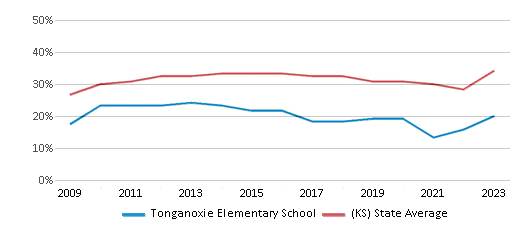
Eligible for Reduced Lunch
7%
7%
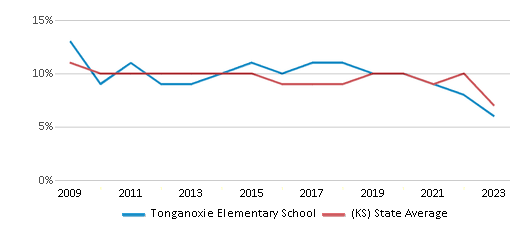
School Statewide Testing
School District Name
Source: National Center for Education Statistics (NCES), KS Dept. of Education
Profile last updated: 02/09/2025
Frequently Asked Questions
What is Tonganoxie Elementary School's ranking?
Tonganoxie Elementary School is ranked #421 out of 1,280 schools, which ranks it among the top 50% of public schools in Kansas.
What schools are Tonganoxie Elementary School often compared to?
Tonganoxie Elementary Schoolis often viewed alongside schools like Basehor Elementary School by visitors of our site.
What percent of students have achieved state testing proficiency in math and reading?
37% of students have achieved math proficiency (compared to the 29% KS state average), while 39% of students have achieved reading proficiency (compared to the 32% KS state average).
How many students attend Tonganoxie Elementary School?
936 students attend Tonganoxie Elementary School.
What is the racial composition of the student body?
84% of Tonganoxie Elementary School students are White, 10% of students are Hispanic, 5% of students are Two or more races, and 1% of students are Black.
What is the student:teacher ratio of Tonganoxie Elementary School?
Tonganoxie Elementary School has a student ration of 15:1, which is higher than the Kansas state average of 13:1.
What grades does Tonganoxie Elementary School offer ?
Tonganoxie Elementary School offers enrollment in grades Prekindergarten-5
What school district is Tonganoxie Elementary School part of?
Tonganoxie Elementary School is part of Tonganoxie School District.
School Reviews
4 10/31/2020
It was a good school though it was confusing.....
5 9/27/2006
Quality of academic programs is well above standard for Northeast Kansas. I myself attended Tonganoxie elementary school back in the 1980's. Tonganoxie Elementary has a conducive learning environment. Individual teacher instruction is available when a student is willing to ask for help. There are extracurricular activities such as baseball and flag football for a nominal cost. The music program involves the students in cultural awareness and learning about music itself. Art is incorporated into the learning experience as individual expression and cultural awareness. The level of parent involvement is good. The PTA fosters a good rapport with the parents and sends a positive image to students. This observation has come from living in other states in the last 15 years. The enrollment has boomed in recent years, without too much compromise put on teacher student ratios from when I was a student in the Tonganoxie School System. I am a 1991 Graduate and KS Regent's Scholar from Tonganoxie High School and lived most of my schooling years in the Tonganoxie School District.
Review Tonganoxie Elementary School. Reviews should be a few sentences in length. Please include any comments on:
- Quality of academic programs, teachers, and facilities
- Availability of music, art, sports and other extracurricular activities
Recent Articles

What Is A Charter School?
Explore the world of charter schools in this comprehensive guide. Learn about their history, how they operate, and the pros and cons of this educational innovation. Discover key facts about charter schools, including admission policies, demographics, and funding, as well as what to look for when considering a charter school for your child.

10 Reasons Why High School Sports Benefit Students
Discover the 10 compelling reasons why high school sports are beneficial for students. This comprehensive article explores how athletics enhance academic performance, foster personal growth, and develop crucial life skills. From improved fitness and time management to leadership development and community representation, learn why participating in high school sports can be a game-changer for students' overall success and well-being.

February 05, 2025
Understanding the U.S. Department of Education: Structure, Impact, and EvolutionWe explore how the Department of Education shapes American education, from its cabinet-level leadership to its impact on millions of students, written for general audiences seeking clarity on this vital institution.





